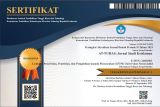RELEVANSI PEMIKIRAN IBNU SINA DAN GEORGE WILHELM FRIEDRICH HEGEL TENTANG PENDIDIKAN
(1) * Moh Wardi
 (STAI Nazhatut Thullab Sampang Sampang Madura)
(STAI Nazhatut Thullab Sampang Sampang Madura) Indonesia
(*) Corresponding Author
AbstractSubstantially, Islam and western culture have the same view about education. Both are oriented in personality and intellectual formation of children, namely the formation of intelligent personal morality. In Islam, the Qur’an, Hadith and Ijma ‘ulama as based in building the concept of education. While in the West understanding, that nationalism becomes fundamental footing. Each civilization has a different character, so that the products also have different characteristics. According to Hegel, as a representation of western figures, Education also defines as something real, transcendence, which is progressive from a subjective or negative, and depending on moral potential. To achieve a positive and essential moral (moral height), one must uphold universal moral and life in environment circles. Eventually, people will attain and gain virtue and moral absolute through education. It is not much different from the view of Ibn Sina as one of the People of Islamic Education assumed that between idealistic values with a view pragmatic. He combines learning materials or theories that children learn in school with jobs of interest. For Ibn Sina ‘, something which is very important thing to be done in the education system is to examine the level of intelligence, characteristics and talents of the children, and keep it in order to determine the favored choice for the future. |
Full Text: PDF
Refbacks
- There are currently no refbacks.
Copyright (c) 2014 Moh Wardi
This journal is licensed under a
Creative Commons Attribution-ShareAlike 4.0 International License





.png)






